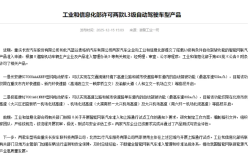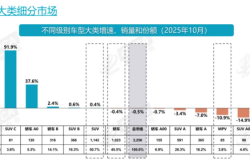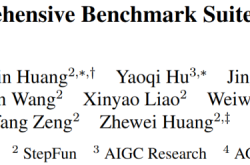DingTalk Ushers in AI Native Era with Major 8.0 Update: No Tricks' Bold Moves
![]() 08/27 2025
08/27 2025
![]() 512
512

Text / Daoge
"We are determined to embark on a fresh start, with a mindset of zero, to create a brand-new DingTalk tailored for the AI era," said Wu Zhao, CEO of DingTalk.
This year marks the 10th anniversary of DingTalk.
On August 25th, DingTalk held a press conference to unveil its version 8.0. The most significant change in 8.0 is its official transformation from a collaborative office app to an AI native platform.
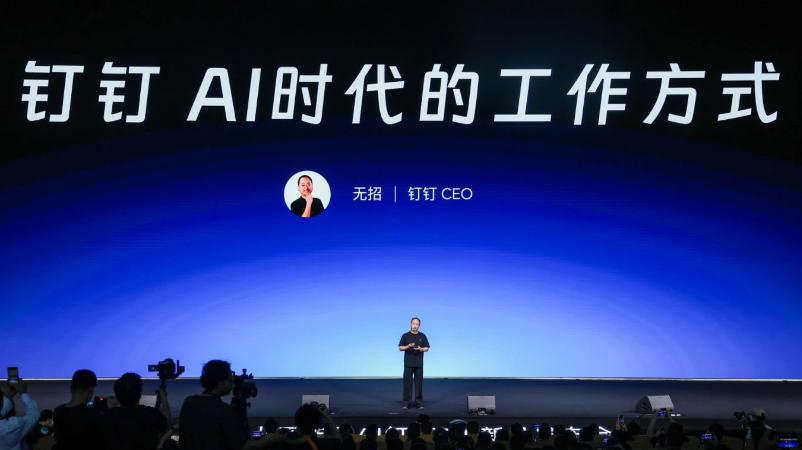
Flashing back to 2015, DingTalk 1.0 made its debut, and over the past decade, it has successfully shaped the working mode of the cloud and mobile internet era. The name of this 8.0 version, "Fern," is significant because ferns are the earliest higher plants on Earth, symbolizing the true maturity of the life system. From Zhibaidao's perspective, this not only signifies No Tricks' ambition since taking office but also implies that DingTalk will take root in industries, innovate from within, and expand its ecosystem externally.
At this press conference, the new DingTalk completely overturned and reconstructed the form of past office products, introducing over 10 AI products simultaneously, such as DingTalk One, the enterprise AI search engine "AI Ask," AI Spreadsheet, AI Note, and the smart hardware DingTalk A1, redefining how people interact, process information, search for knowledge, and create applications in the AI era.
DingTalk has now covered everything from systems to hardware centered around AI, reflecting DingTalk's commitment to creating an AI native office platform and Alibaba's ambition for "AI ToB".
01 New DingTalk One: Transforming Office Software into "AI Mode"
Zhibaidao learned on-site that the core of DingTalk's new products is one sentence: to make work simpler, and the method is to upgrade office software to "AI Mode".
Several products launched at the conference are highly practical. In Zhibaidao's view, these products embody a three-tier capability that gradually rises:
Product Function Innovation and Enhanced Office Efficiency
The most practical is "DingTalk One." In the past, employees had to switch back and forth between group chats, to-dos, documents, and spreadsheets to find information, but now AI automatically organizes these scattered work contents into information flow cards based on importance, pushing them to you like short videos, eliminating the need for "people to find things." By long-pressing the button, you can also give voice commands to AI, such as "schedule a meeting for 10 AM tomorrow" or "summarize last week's sales data," and AI will directly perform the operations for you, saving a lot of clicking effort.
Software and Hardware Integration to Expand Application Scenarios
DingTalk's first hardware product, DingTalk A1, performed exceptionally well. Zhibaidao learned on-site that the 1,000 units limitedly released at the press conference have already sold out. Many people shared screenshots of their orders after the conference. In terms of the product, it is as thick as a few credit cards, can be attached to a mobile phone, can record sounds from up to 8 meters away during meetings, and can also convert speech to text in real-time and generate meeting minutes. It has a battery life of up to 45 hours and offers 1,000 minutes of free transcription. Whether it's for regular meetings or taking training notes, you won't have to scramble to write things down.
Meeting Diverse Needs of Enterprises
DingTalk's new products cater to the diverse needs of different types of enterprises.
For example, "AI Ask" solves the problem of "finding information like searching for a needle in a haystack." Whether it's checking colleagues' contact information, inquiring about project progress, or asking for "Q3 2023 sales in East China," it can automatically integrate chat records, spreadsheets, documents, and even CRM data that you have permission to view, directly providing organized results.
AI Spreadsheet has also become "smarter." In the past, making spreadsheets required learning functions and adjusting formats, but now you just tell AI your needs, such as "create a monthly attendance statistics table," and it will automatically generate the table and dashboard; it also adds over 100 "Field Agents," such as an inspector at Shandong Weiqiao taking a photo of equipment, and AI can automatically identify potential hazards, write rectification suggestions, and push notifications to the responsible person, eliminating the need for manual reorganization and reducing accident rates.
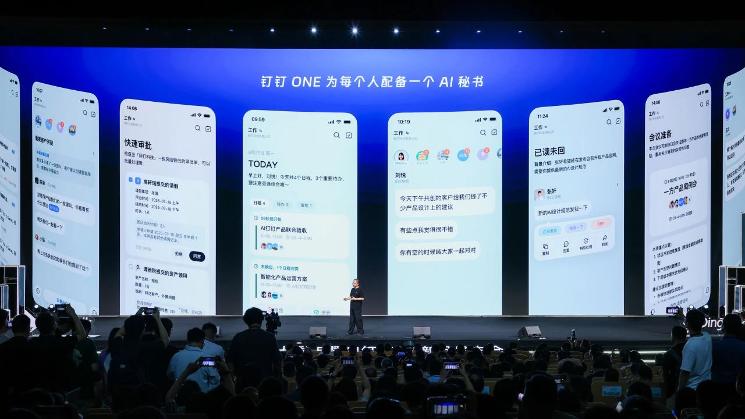
In Zhibaidao's view, DingTalk aims to "redefine office" with AI this time – where office software was once just a "tool," but now AI is intended to become an "assistant" that helps people handle repetitive tasks.
More importantly, the release of DingTalk version 8.0 marks the official transition of the collaborative office app with the largest user base in the mobile internet era to AI native. Through "Platform + Agent + Hardware," DingTalk's new strategy is to build an AI infrastructure that can connect enterprise data, business flows, and people.
Behind this strategy lies not only the goal of building a more powerful operating system but also Alibaba's ambition for AI ToB.
02 No Tricks' Moves: Abandoning "Feature Piling" and Crafting an AI "Native Operating System"
No Tricks has been back for nearly five months, and this press conference became a test of his achievements.
In 2025, with the return of "first-generation founders" like Joseph Tsai and Simon Wu, Alibaba initiated a comprehensive AI transformation, urgently needing a leader who understands both ToB business and entrepreneurial spirit. No Tricks' return became inevitable – he was reintegrated into the system and given a new positioning for DingTalk as an "AI native office platform".
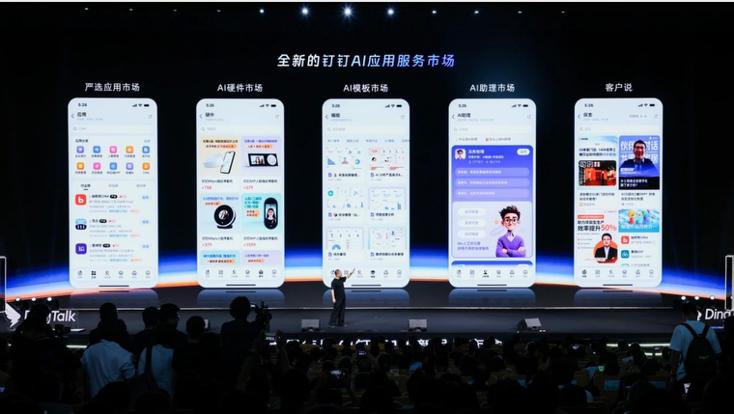
After taking office, No Tricks initiated a rapid transformation. The core was streamlining, moving from "feature piling" to AI reconstruction.
On his first day back, No Tricks launched the "Product Experience Annihilation Campaign," requiring the team to investigate the minimum viable product (MVP) scenarios for all features and compare them one by one with competing products. For example, in response to user complaints about the login process, DingTalk compressed the multi-device synchronization time from 15 seconds to 3 seconds; for unstable network scenarios, it optimized the message retransmission mechanism, increasing the success rate to 99.9%.
More disruptively, No Tricks restarted the co-creation model from the early days of entrepreneurship. He led a secret visit to customers in Beijing, Guangdong, and East China, requiring middle managers to visit at least 3 enterprises per week to directly obtain front-line needs.
Previously, DingTalk's excessive pursuit of paid conversions had led to a decline in user experience, such as splash screen ads and paid feature walls. No Tricks immediately adjusted the strategy upon taking office:
Step 1: Remove paid barriers: Eliminate paid restrictions on basic functions such as attendance statistics and approval templates, shifting the paid threshold from functional modules to value-added services.
Step 2: Optimize the payment structure: In the first half of the 2025 fiscal year, DingTalk's ARR (Annual Recurring Revenue) exceeded US$200 million, with the contribution of AI value-added services jumping from 15% to 40%, and customer renewal rates increasing to 85%.
Step 3: Organizational structure upgrade: No Tricks made a surgical knife-like adjustment – breaking the "headquarters-region" hierarchical system and establishing a matrix structure of "industry columns + product rows".
In Zhibaidao's view, the release of DingTalk 8.0 is essentially Alibaba's redefinition of the enterprise services operating system – through AI native functions, an open ecosystem, and deep ties with vertical industries, building a complete closed loop covering "data collection – analysis – application – hardware".
If this strategy is successful, DingTalk will not only be a tool provider but also the digital infrastructure for enterprises' digital transformation. The challenges currently facing DingTalk are the speed of AI native function implementation, the depth of vertical industry solutions, and the sincerity of ecosystem openness, which will be the key variables determining the outcome of this "operating system" battle.
03 Alibaba's ToB Ambition: From "Tool Provider" to "Productivity Engine"
Currently, China's collaborative office market is dominated by DingTalk, WeChat Work, and Feishu, with a combined coverage rate of 92%, but the competition logic has shifted from functional benchmarking to deep gaming of ecosystems and technologies. Alongside the release of DingTalk version 8.0, all three giants are reshaping their products with AI as the core driver.
Behind this lies the transformation of collaborative office platforms from tool providers to capability enablers.
In Zhibaidao's view, in the future, the deciding factor in the collaborative office sector will be the industry depth of AI implementation – whether technology can be deeply tied to scenarios, which determines whether participants can upgrade from "office tools" to "digital productivity platforms." And DingTalk's advantage lies precisely in its scenario-based capabilities.
If the fierce competition in the collaborative office sector is just the competition floating on the surface, then from a longer-term perspective, DingTalk's new product launch and No Tricks' return signify Alibaba's strategic repositioning in the enterprise services sector in the AI era.
This is not only an iteration of product features but also a systemic change from organizational structure to industry ecosystem, reflecting Alibaba's ambition for ToB business.
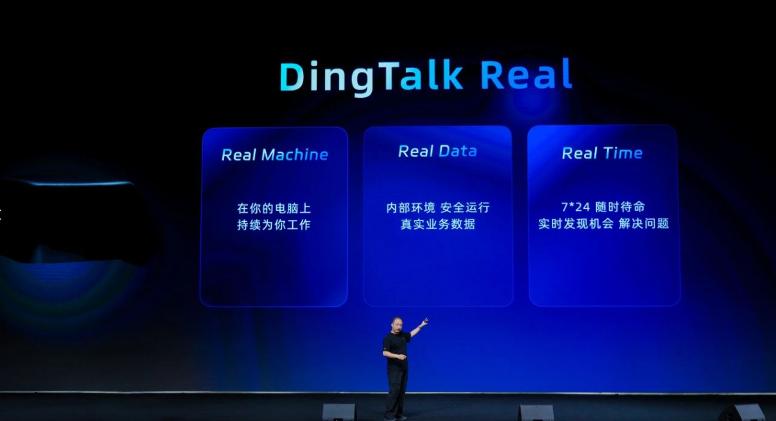
DingTalk is positioned as a strategic entry point for Alibaba, tasked with the mission of traffic conversion. DingTalk currently has over 300,000 ISVs (Independent Software Vendors), so how can it get top partners to join its platform strategy?
No Tricks' solution to breaking the deadlock is technology empowerment, by opening up the AI model training platform to allow partners to train exclusive models based on DingTalk data. The effect has been significant, with DingTalk currently attracting over 2,000 enterprises to participate.
From a strategic perspective, No Tricks' return is a key move by Alibaba in betting on the AI ToB track. His core mission is to upgrade DingTalk from a collaborative tool to an "AI native office operating system" – which requires reconstructing the relationships between people and work, enterprises and technology, ecosystems, and competition.
In the next three years, whether DingTalk can defend its market share and achieve a leap from "tool provider" to "productivity engine" through AI innovation will determine the outcome of China's enterprise services market.
And every decision made by No Tricks will stir up waves in this trillion-dollar market.
*Title image generated by AI


